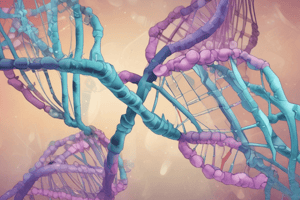Podcast
Questions and Answers
What technique did Rosalind Franklin utilize to reveal the structure of DNA?
What technique did Rosalind Franklin utilize to reveal the structure of DNA?
- X-ray diffraction (correct)
- Polymerase chain reaction
- Electron microscopy
- Sanger sequencing
Which of the following statements about Watson and Crick's model of DNA is NOT correct?
Which of the following statements about Watson and Crick's model of DNA is NOT correct?
- It included the concept of complementary base pairing.
- It relied on data from other scientists, including Rosalind Franklin.
- It explained the arrangement of nucleotides. (correct)
- It proposed a double helix structure.
What do the 5’ and 3’ ends of a DNA strand refer to?
What do the 5’ and 3’ ends of a DNA strand refer to?
- The orientation of the sugar-phosphate backbone. (correct)
- The number of hydrogen bonds between base pairs.
- The types of nitrogenous bases present.
- The percentage of adenine and cytosine.
According to Chargaff's rule, which statement is true regarding the composition of DNA?
According to Chargaff's rule, which statement is true regarding the composition of DNA?
What was a key conclusion about DNA made by geneticists in the mid-20th century?
What was a key conclusion about DNA made by geneticists in the mid-20th century?
Which characteristic of DNA structure did Rosalind Franklin's X-ray diffraction reveal?
Which characteristic of DNA structure did Rosalind Franklin's X-ray diffraction reveal?
In the DNA double helix, how far apart are the bases spaced?
In the DNA double helix, how far apart are the bases spaced?
What did the experiments conducted by Martha Chase and Alfred Hershey ultimately conclude?
What did the experiments conducted by Martha Chase and Alfred Hershey ultimately conclude?
What was Frederick Griffith trying to understand through his experiments?
What was Frederick Griffith trying to understand through his experiments?
What was the outcome when Griffith injected heat-killed S strain with live R strain into the mice?
What was the outcome when Griffith injected heat-killed S strain with live R strain into the mice?
What term did Griffith use to describe the transfer of information from dead S strain cells to live R strain cells?
What term did Griffith use to describe the transfer of information from dead S strain cells to live R strain cells?
What did Avery, MacLeod, and McCarty conclude from their experiments related to transforming material?
What did Avery, MacLeod, and McCarty conclude from their experiments related to transforming material?
Which strain of Streptococcus pneumoniae is described as virulent in Griffith's study?
Which strain of Streptococcus pneumoniae is described as virulent in Griffith's study?
What effect did DNA-digesting enzymes have on the transforming ability of the material in Avery’s experiment?
What effect did DNA-digesting enzymes have on the transforming ability of the material in Avery’s experiment?
In the context of vaccine development, what is the purpose of introducing a killed or weakened pathogen?
In the context of vaccine development, what is the purpose of introducing a killed or weakened pathogen?
What was a key question raised by scientists following Griffith's and Avery et al.'s findings?
What was a key question raised by scientists following Griffith's and Avery et al.'s findings?
Flashcards are hidden until you start studying
Study Notes
Rosalind Franklin’s Experiments
- Extracted DNA from cells and crystallized it.
- Employed X-ray diffraction techniques to analyze DNA crystals.
- Produced an X-pattern on X-ray film, indicating a helical structure of DNA.
Watson and Crick’s DNA Model
- Constructed a DNA model using Franklin’s X-ray data along with findings from other scientists.
- Proposed DNA as a double helix with a sugar-phosphate backbone and base pairs located on the inside.
- Spacing between bases is approximately 0.34 nm, and one complete turn of the helix measures 3.4 nm.
- Strands of DNA run antiparallel, oriented from 5’-3’ and 3’-5’.
- 5' end features a phosphate group on the fifth carbon of the sugar; 3' end has a hydroxyl group on the third carbon.
- Followed Chargaff’s rule: adenine (A) pairs with thymine (T) and guanine (G) with cytosine (C), connected by hydrogen bonds.
- Base pairing follows complementary pairing rules; purines bond with pyrimidines.
Key Discoveries in DNA Structure
- 1950s discoveries confirmed DNA as the genetic material across all organisms.
- Variation in percentages of A, T, G, and C observed among different species, affirming the helical nature of DNA via X-ray diffraction.
- Chargaff’s rule highlights base composition differences across species.
Frederick Griffith's Experiment (1928)
- Explored virulence through experiments with Streptococcus pneumoniae, identifying S (virulent) and R (nonvirulent) strains.
- Mice infected with live S strain died, while R strain remained harmless.
- Heat-killed S strain also did not kill mice, but the combination of heat-killed S strain and live R strain resulted in death.
Griffith's Conclusion
- Surmised that virulence information from dead S strain cells transformed live R strain cells.
- Introduced the concept of "transformation" for the transfer of genetic information.
Avery, MacLeod, & McCarty's Findings (1944)
- Repeated Griffith’s experiments using purified cell extracts to identify genetic material.
- Demonstrated that removing proteins from the transforming material did not inhibit transformation of R strain cells.
- Concluded that DNA-digesting enzymes eliminated the transforming ability, confirming that DNA is the genetic material.
Implications of This Research
- Established that DNA is responsible for carrying genetic information, shifting the scientific focus from proteins to DNA as the key molecule in heredity.
- Laid the groundwork for future research on DNA, genetic engineering, and molecular biology.
Understanding Vaccines
- Defined as biological substances that enhance immunity against specific diseases.
- Consist of non-harmful forms of viruses, bacteria, or their components, and stimulate the immune system to produce antibodies.
- Resulting immunity protects individuals from subsequent infections by the pathogen.
Studying That Suits You
Use AI to generate personalized quizzes and flashcards to suit your learning preferences.





